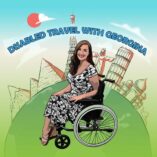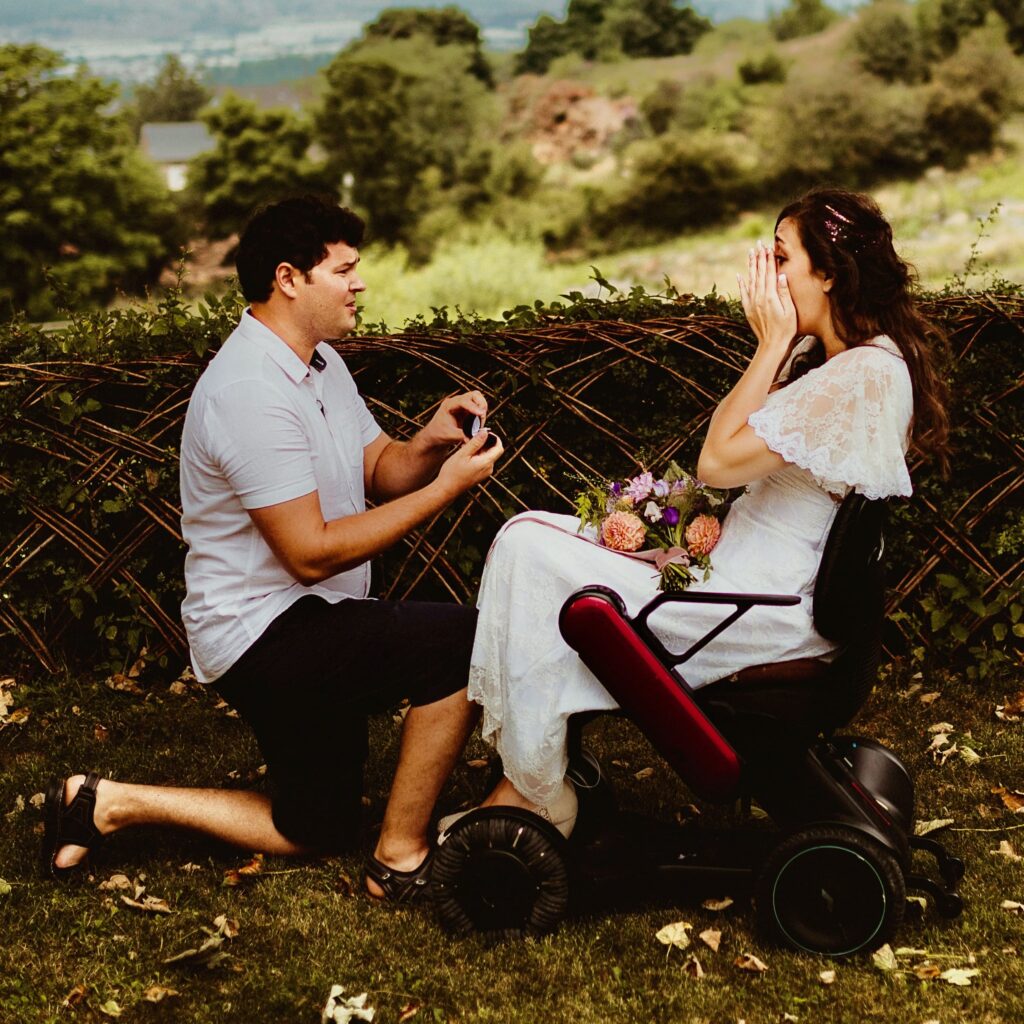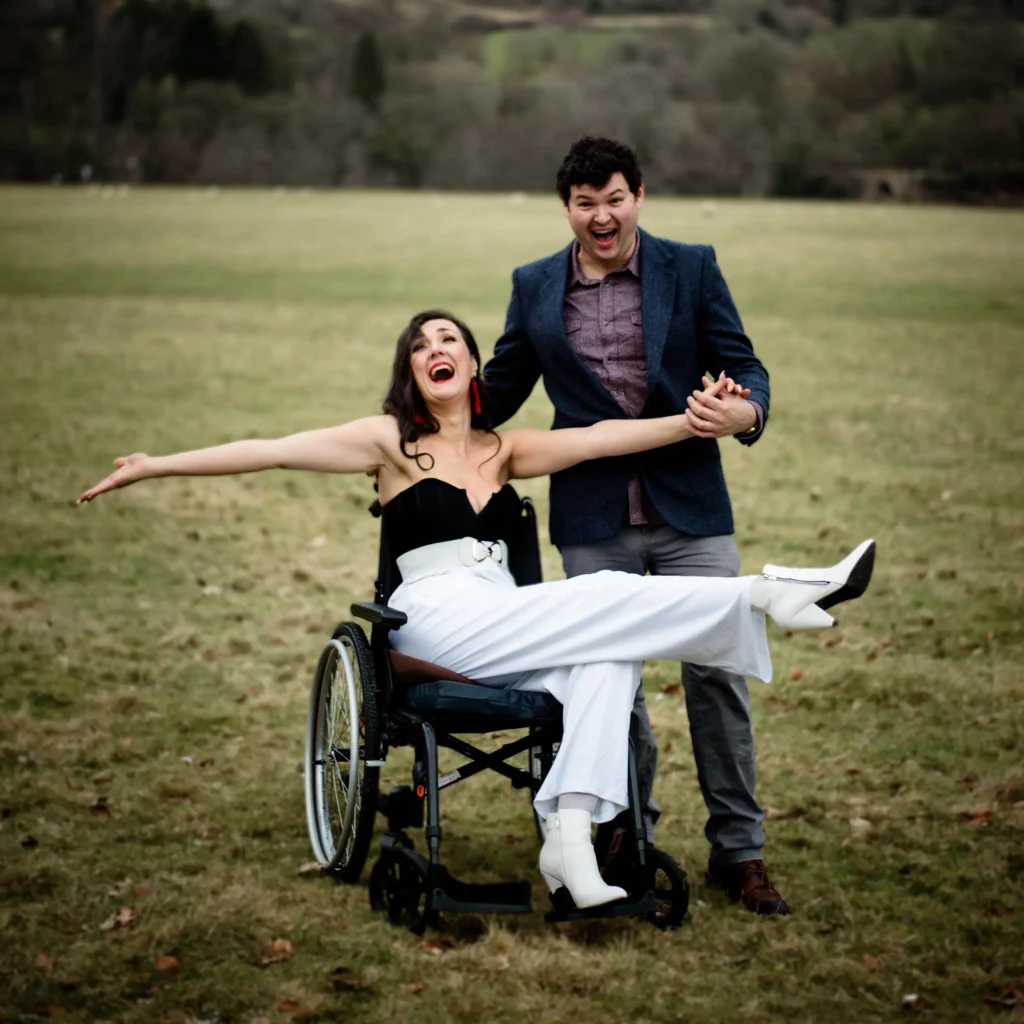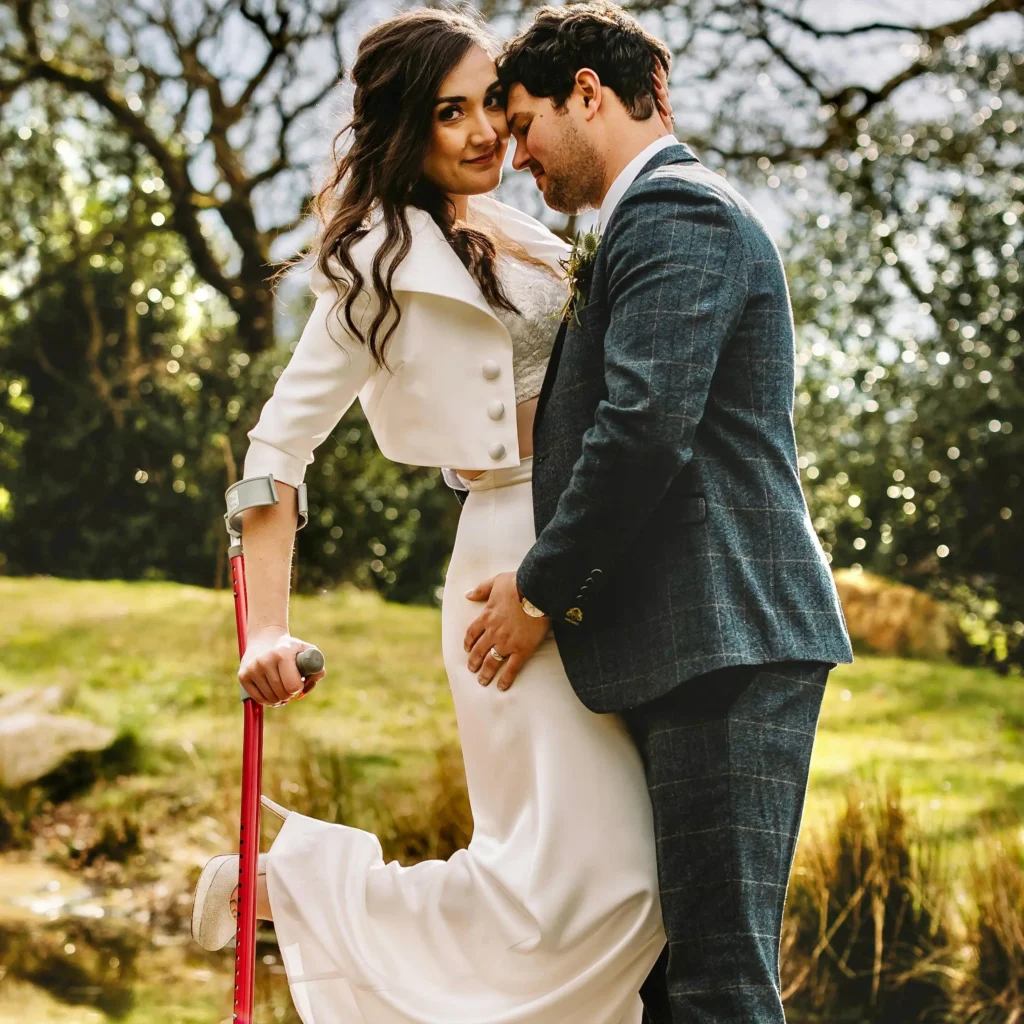Hi everyone! I have been slightly quieter on this blog that I would have liked recently. This has been for a variety of reasons really; firstly, I have recently had a significant operation to have a PEGJ feeding tube inserted so have been in and out of surgery due to a few complications there and, secondly, I have been helping a friend of mine (@quinlancouturebridal) who is going to be opening up a bridal shop where all of her wedding dresses are accessible to all brides, including those with disabilities and those who use mobility aids! There has unfortunately had to be a lot of work behind the scenes going on there with her local MP to find a suitable place for the shop to be situated that has level-access adaptations. We also worked out that less than 18% of bridal dress shops within an hour and a half’s drive of her shop location in Doncaster are actually fully wheelchair accessible with a ground-floor toilet! The amount of times I was disappointed with the access or descriptions of access was unreal!!
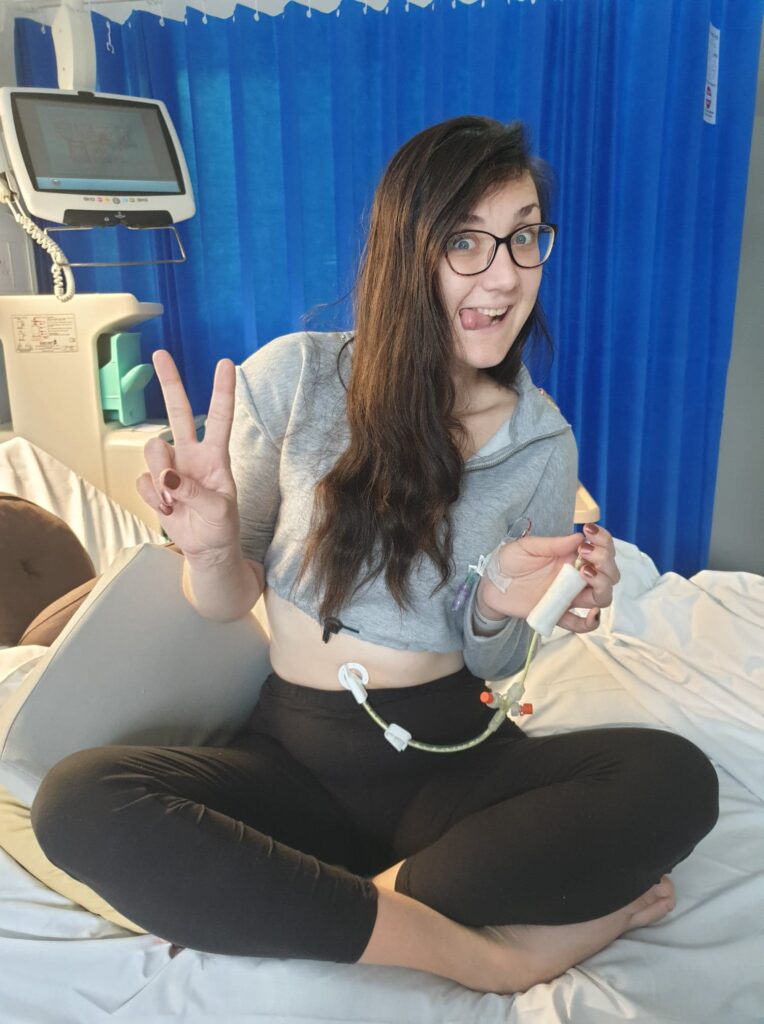
hand – this particular tube was leaking stomach acid and I had to go back into surgery within the hour.
Anyway, I have actually been lucky to have had another wave of followers while I’ve been bouncing in and out of hospital with my PEGJ tube so I thought I’d do a brief introduction alongside my post! I’m Georgina and I’m a 27 year old bride-to-be, I’m a self-proclaimed mess when it comes to my health and have a grand old collection of sixteen chronic health conditions that have affected me in varying different ways throughout my wedding planning progress. I’ve documented the triumphs and failures of the wedding industry so far on my own blog, Disabled Travel with Georgina and Instagram (@disabledtravelwithgeorgina), which has been a record of my engagement and planning process since the pandemic limited the safety for travel, particularly for those with pre-existing health conditions. Travel was my previous focal point of the blog and I will return to also reviewing hotels, restaurants and attractions for accessibility alongside my wedding-based content when things are safer for disabled people like me. I am lucky to have had both of my Covid vaccinations so things are certainly made easier by that privilege!
I wanted to write a brief post today about why I decided to shine a light on the wedding industry and what I think needs to change. Of course, this is just one disabled bride-to-be’s opinion and there are extensive ways that the wedding industry fails to meet access requirements and disability needs unfortunately. Feel free to pop an email across to disabledtravelwithgeorgina@gmail.com if I’ve missed anything glaringly obvious and I’ll include that also.
1) Representation
Whether you realise it or not, the models and people you see really do have an effect on your perception of what a “bride” should look like and what a “perfect wedding day” would be. When you think about it, when was the last time you saw disability represented through a bridal dress model, a wedding venue’s advertisement videography clip featuring a happy couple or even through billboards/ runways at a wedding fayre you’ve been to?
I think representation is so important as it normalises the fact that every body type and type of couple is beautiful and you can be a stunning bride, groom or partner no matter whether you have are wholly abled or have invisible or visible disabilities. Personally, I am a full-time wheelchair user but am ambulatory in the fact that I can stand and may use crutches for a couple of steps on my wedding day. I’m working hard with the different suppliers and venues that I meet to try and help them consider hiring some of the wonderful disabled models that are out there. There are so many agencies that either specialise wholly with diverse models or those that have amazing chronically ill folx on their modelling books that suppliers, venues and bridal shops within the industry should certainly think about hiring!
Personally, I have wheeled the runway in a large Midlands Wedding Fayre, modelled in various styled shoots and featured in campaigns for those in the industry. As a society, our accepted perception of beauty needs to change and we need to welcome the wonderful chronically ill and disabled crew into our concept of stunning, wedding-ready people! All bodies are good bodies and I think our beauty standards are definitely ableist in that they normalise white, thin, cis, heterosexual, able-bodied brides as the ONLY way to be the ideal centre of beauty when that is wholly incorrect – Every. Single. Person. can rock their own perfection on their wedding day and we need to include everyone in our own inner perception of wedding beauty!
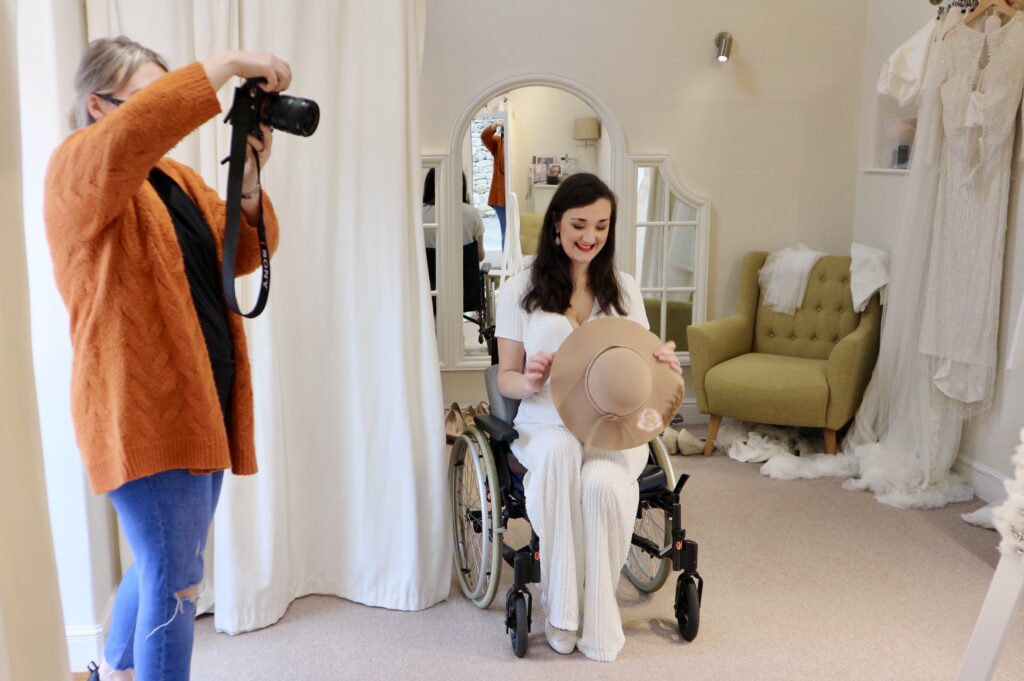
I’ll talk about this shoot soon on the blog when we get the official photos back!
2) Access
So this is a hard one to write in detail about as disability is so varied; each person can have completely different access requirements. My personal needs for step-free access, disabled toilets, charging ports for feeding tube machines (enteral feeding for my PEGJ) etc will be completely irrelevant for a disabled person whose needs are that they require a hearing loop at a venue or subtitles on a wedding venue’s advertisement video in order to follow the audio content since they have hearing loss or are deaf. Obviously, some physical wedding venues, such as churches, where you may get married or places you may hold a wedding reception may be listed buildings which means that due to the age and historic nature of the property, they cannot have adaptations such as lifts or disabled accessible toilets added to the pre-existing structure. These are understandable circumstances but there are many, many other situations where I have visited venues or vendors as either a blogger or a bride-to-be and found that there are even small tweaks they could do to make themselves more accessible.
I will be writing a whole piece on how we helped a lovely bridal dress shop owner (@AlexandraAnneBridal) ensure that her shop was as accessible as possible and that will be released soon on here so you’ll see some specifics on there about how I would “audit” a physical venue and add small adaptations to help a disabled customer feel welcome or even help them be able to access your stock at all. There are 14.1 million disabled people living in the UK alone (source) and these are all customers that could increase a shop’s revenue and reputation! Plus, these are each customers who deserve equality in their wedding planning experience! There are so many inexpensive adaptations you could add to your building to help a disabled bride/ groom/ partner’s experience such as ramps, toilet seat risers or grab rails for a start. If you have the space and ability, please please add these little tweaks to your venue or shop to help your future customers, their bridal party or their guests.
An important thing to remember as well is that access starts online. Think about how a person with a disability might experience your particular venue and place all those things on an access page on your website. As a chronically ill customer, I jump for JOY when I see things like photographs of doorways, steps and bathrooms on an access page or high-resolution scans of menus (so a visually impaired consumer can zoom in on options online prior to visiting). The access page is made even better if you tell me measurements of tight corners/ narrow corridors so I can work out whether my wheelchair can fit down there!!
Also, in all of your social media campaigning and on your website, you should be including image IDs. These are subtitles in the captions on Instagram or Facebook that aid the experience of a visually impaired or hard of hearing viewer. There should be two IDs under every photo you post; one should be suitable for those that are visually impaired and therefore describe everything in a picture you can SEE and one should be for the hard of hearing an describe everything in a video that you can HEAR. Obviously omit the second ID if there is no sound to your advertisement. There are plenty of helpful guides to this online such as this one by Christy on her blog Living with Disability.
3) Communication
This continues slightly from my previous point about how access starts online I suppose; there are certain things that a disabled or chronically ill person will want to clarify with you prior to booking your venue or services. It might be that they will ask these questions ahead of time from you but also, as a supplier or venue owner, you should also be enquiring as to whether there are any access requirements for each booking and whether there is anything you can do to make the lives of these people easier.
A further development of this is the hesitancy that I have found many suppliers have when asking disability related questions. Personally, I have no problems at all answering questions that relate to my disability that directly impact the service that the person in providing. For example, I talked my photographer through how I moved, the movements that caused me the most pain and the ways that I can be ambulatory with minimal fatigue caused. These are all disability related points but will help me get the best wedding photos possible without every single one of them being me sat, static in a wheelchair in the same formal pose as directed by an uninformed photographer. As it so happens, I have an amazing wedding photographer who had no hesitation in asking the important chronic illness questions in a very unobtrusive way (part of the reason we booked her really!) so we are very thankful not to have had any problems with her specifically. However, I find it a very common theme that there is awkwardness and hesitancy surrounding access requirements rather than just asking the guest or customer outright questions in a polite way that would make their experience on their wedding day better and potentially less painful/ tiring.
The form of communication a vendor uses is also very important. I love to see websites that list alternative communication methods such as emails alongside phone numbers. This will help people communicate that might be hard of hearing/ deaf or those with anxiety who might find it less intense to write an email rather than have a full conversation constantly.
Obviously, these three points are just a brief summary of ways that I can see the wedding industry needs to attempt to improve and change. Personally, I think there is a huge revenue stream of 14.1 million UK disabled people for the wedding industry in this country that is ready to be tapped into. Beyond this, every single person who is getting married deserves a stunning, memorable day with beautiful moments. I’ve already run into ableism and slight discrimination and I’ve only been engaged for 10 months!!
The run-up to a wedding day is stressful for anyone who is about to get married so please, if you are a supplier, vendor or in any way involved in the wedding industry, don’t add to that stress!!
